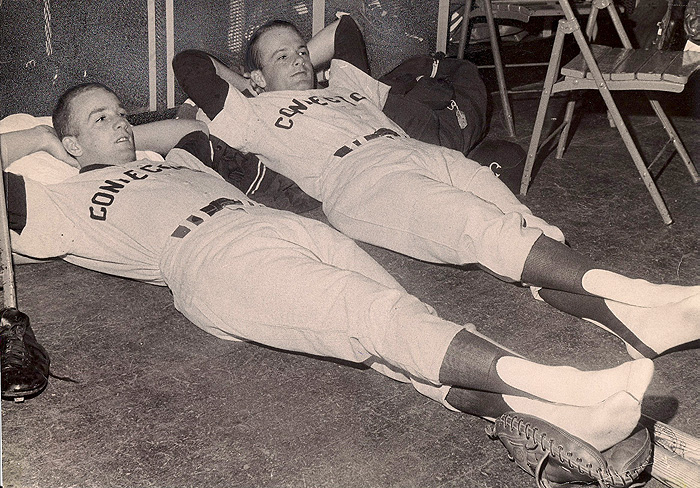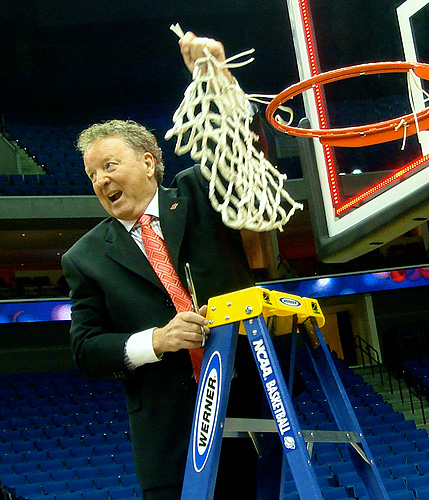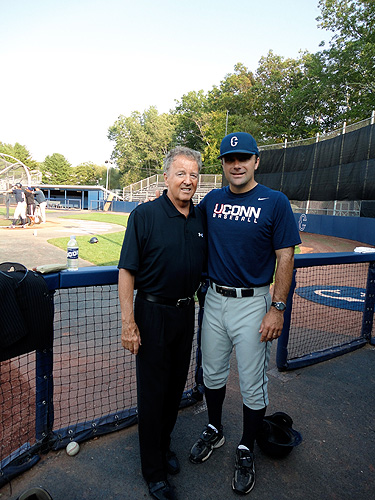The title of Tom Penders’ basketball memoir, Dead Coach Walking: Tom Penders Surviving and Thriving in College Hoops, is only partially a reference to the sports axiom that coaches are hired to be fired.

Penders, a 1967 graduate of UConn who played basketball and baseball as a Husky, was diagnosed with a heart murmur as a youngster but excelled as an athlete in high school and college. In 1997, however, during a routine physical exam, he was diagnosed with cardiomyopathy and told he could suffer cardiac arrest at any time. He had a defibrillator implanted in his chest and went on to coach for another 13 years.
“I used to use that with my players – you’ve got nothing to lose. You’re already dead. It makes you the most dangerous fighting machine in the world,” says Penders, who became known as “Turnaround Tom,” for his record of turning poorly performing teams into competitive tournament squads.
During his 36 years as a basketball coach, he coached at seven universities, from the Ivy League to the Southwest Conference, and led teams to 12 NCAA Tournaments.
As an undergraduate at UConn, Penders was coached by Fred Shabel, and played on teams with Husky legends Wes Bialosuknia and Toby Kimball in two NCAA Tournaments, in 1965 and 1967. He and his brother Jim also were teammates on the Husky baseball team that played in the 1965 College World Series. His career as a basketball coach in Division I included stops at Tufts, Columbia, Fordham, Rhode Island, Texas, George Washington, and Houston.
When he retired last year with a career record of 648-438, Penders ranked fourth among active coaches in games coached, behind only Hall of Famers Jim Calhoun, Mike Krzyzewski, and Jim Boeheim.
“I’m just lucky to be living. I hope it’s a motivational story about overcoming things,” Penders says. “That’s what I did. I was always too small, or couldn’t do this or that. I never listened to anybody. I just went out and did whatever was needed to be successful.”

In the book, written with veteran sportswriter Steve Richardson and published by Reedy Press, Penders provides an inside look at college basketball at the highest level – talking about coaching strategies and recruiting, and telling locker room stories. He also offers his perspective on how the sport has changed, and a critique of what should change.
“I wanted to wait until the end of my career and make it different than a regular coaching book,” he says. “I think every coach would like to do something like this. I’ve always been one who’s told it like it is. This book tells it like it is in the belly of the beast, as well as a little history or biography as a coach.”
In discussing the book, Penders amplifies his comments on several key issues:
On the Ratings Percentage Index (RPI), used to rate NCAA teams: “The RPI is a ridiculous joke on America and anybody that follows the sport. You can go play 12 non-league games against the worst teams in the country and be in the top 10 in the RPI going into your league. It means nothing. Nobody knows where anybody starts off. Does UConn start off at No. 10 or No. 250? Nobody can figure that out. Like all computer things, if you put garbage into a computer, garbage will come out.”
On bias toward major conferences in NCAA Tournament selection: “It’s harder to get in the tournament today unless you’re in a big name conference. We were knocking on the door basically every year. Ironically, [in Houston] the youngest and most inexperienced team I had was the one that won the [conference] tournament. We didn’t get healthy until tournament time. We won four games in four days, and we weren’t challenged in any of them.”
On athletic directors and conference commissioners instead of coaches as members of the NCAA Tournament selection committee: “It would be like me being the diving judge at an Olympic event. They have no idea how to pick a basketball team. Someday, hopefully while I still understand what’s going on in basketball, they’re going to have basketball people only on that committee. Jobs are lost because of the selection; kids are heartbroken every year because their team doesn’t get into that tournament. The people determining it have a conflict of interest, and nobody can tell me that they don’t.”

Penders says his reputation as a coach who could turn programs around started when he took a Tufts team that had a 1-17 record the year before he arrived in Medford, Mass., and within two years had back-to-back 20-win seasons. He extended his track record as “Turnaround Tom” with every team he coached.
“There’s nothing more satisfying as a coach than taking a bad team and making them good,” he says. “What you’re doing is you’re changing culture, the way kids look at their college experience, whether or not they’re going to be friends for the rest of their lives. When you’re building something it can last for a lifetime. Some coaches find one place; they’re happy and love it. I was a rolling stone – never minded moving, and I love challenges. Usually I got bored after six or seven years at one place, if I lasted that long.”
Penders says he admires the coaching demonstrated this year by Jim Calhoun, who led the Huskies to their third national championship.
“[It was] a great coaching job. If you stay around coaching, you’re going to have a team that’s expected to go somewhere and doesn’t. This was totally unexpected. That’s even sweeter,” he says. “Those kids just grew and got better. Once they started winning in the [Big East] tournament, they just continued to play at a very high level, and there was no way once they got to Houston they were going to give it up. You could just see it.
“When a kid like Kemba Walker is leading you – who never really had a bad game during that stretch of time – that’s a special player, a leader. He’s an old school ballplayer in this regard. It’s hard to find good leaders today. I think Jimmy’s team the year before was more talented, but they didn’t have a leader. Kemba wasn’t ready to be a leader last year. This year he was the consummate leader.”
Dead Coach Walking is available at the UConn Co-op and online through ReedyPress.com or online booksellers. Book signing events will be listed on the book’s website.


